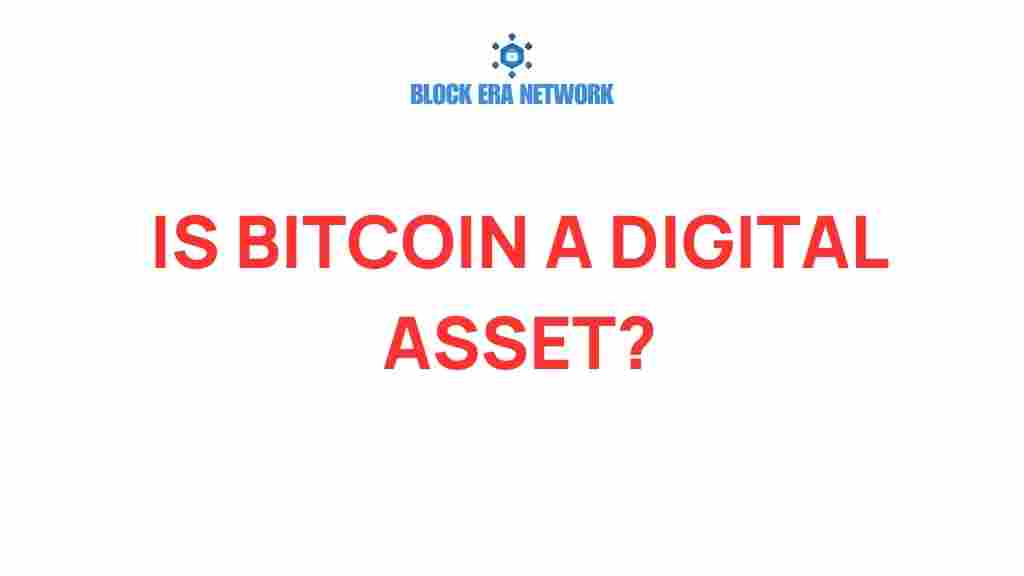Is Bitcoin the Ultimate Digital Asset of Our Time?
The rise of Bitcoin has sparked a revolution in the world of finance, positioning it as a leading digital asset and the flagship of the cryptocurrency movement. With its innovative use of blockchain technology, Bitcoin offers unique opportunities for investment, wealth preservation, and participation in the emerging world of decentralized finance (DeFi). In this article, we will explore the significance of Bitcoin in today’s financial landscape, its potential as an investment vehicle, and its implications for future market trends.
The Financial Revolution: Understanding Bitcoin’s Emergence
Bitcoin was created in 2009 by an anonymous figure known as Satoshi Nakamoto. Since its inception, it has experienced significant growth and adoption. Here are some key points about Bitcoin’s emergence:
- First Cryptocurrency: Bitcoin is the first cryptocurrency, introducing the concept of a decentralized digital currency.
- Blockchain Technology: Its underlying technology, blockchain, allows for secure, transparent transactions without the need for intermediaries.
- Limited Supply: Bitcoin has a capped supply of 21 million coins, which contributes to its value as a scarce asset.
- Increasing Adoption: Major companies and institutions are beginning to adopt Bitcoin as a legitimate form of payment and investment.
Bitcoin as a Digital Asset
Bitcoin is often referred to as a digital asset due to its unique characteristics that differentiate it from traditional assets like stocks or bonds:
- Decentralization: Unlike traditional currencies, Bitcoin operates on a decentralized network, reducing the control of any single entity.
- Portability: Bitcoin can be easily transferred across the globe, making it an ideal choice for international transactions.
- Security: The blockchain technology behind Bitcoin ensures that transactions are secure and immutable.
- Store of Value: Many investors view Bitcoin as a form of digital gold, a reliable store of value amidst inflationary pressures.
Investment Opportunities in Bitcoin
Investing in Bitcoin presents numerous opportunities, but it also comes with risks. Here’s a step-by-step process for getting started:
Step 1: Research and Education
Before investing in Bitcoin, it is crucial to educate yourself about the cryptocurrency market and the factors that influence Bitcoin’s price.
Step 2: Choose a Reliable Exchange
Select a reputable cryptocurrency exchange to buy Bitcoin. Some popular exchanges include:
- Coinbase
- Binance
- Kraken
Step 3: Create a Wallet
Secure your Bitcoin by creating a digital wallet. Wallets can be categorized into:
- Hot Wallets: Online wallets that are convenient but may be more vulnerable to hacks.
- Cold Wallets: Offline wallets that provide greater security for long-term storage.
Step 4: Make Your Purchase
Once you have set up an account on the exchange and created a wallet, you can proceed to purchase Bitcoin. Start with a small investment until you become more familiar with the market.
Step 5: Monitor Market Trends
Stay informed about the latest market trends and news regarding Bitcoin and the broader cryptocurrency market. Use tools like:
- CoinMarketCap
- CryptoCompare
- Twitter and Reddit communities
Wealth Preservation through Bitcoin
In times of economic uncertainty, many investors turn to Bitcoin for wealth preservation. Here’s why:
- Hedge Against Inflation: Bitcoin’s limited supply means it cannot be printed like fiat currencies, making it a hedge against inflation.
- Global Acceptance: As more people adopt Bitcoin, its value is likely to increase, preserving wealth over time.
- Asset Diversification: Including Bitcoin in your investment portfolio can reduce risk and enhance returns.
Decentralized Finance (DeFi) and Bitcoin
The rise of decentralized finance (DeFi) has further enhanced Bitcoin’s appeal as a digital asset. DeFi platforms allow users to lend, borrow, and earn interest on their cryptocurrency holdings without intermediaries.
- Access to Financial Services: DeFi opens up financial services to unbanked populations worldwide.
- Yield Farming: Investors can earn passive income by participating in yield farming on various DeFi platforms.
- Interoperability: Bitcoin can be used in conjunction with other cryptocurrencies in DeFi applications, expanding its utility.
Challenges and Risks of Bitcoin Investment
While Bitcoin presents many opportunities, there are also challenges and risks to consider:
- Volatility: Bitcoin is known for its price volatility, which can result in significant gains or losses.
- Regulatory Risks: The regulatory environment for cryptocurrencies is still evolving, which can impact Bitcoin’s future.
- Security Risks: While blockchain technology is secure, exchanges and wallets can be vulnerable to hacks.
Troubleshooting Common Bitcoin Issues
If you encounter issues while investing or transacting with Bitcoin, consider the following troubleshooting tips:
- Transaction Delays: If your Bitcoin transaction is delayed, check the network congestion and consider increasing the transaction fee.
- Incorrect Wallet Address: Always double-check the wallet address before sending Bitcoin; transactions cannot be reversed.
- Access Issues: If you have trouble accessing your wallet, ensure you have your recovery phrase or private keys.
The Future of Bitcoin
The future of Bitcoin as a digital asset seems promising, with several factors influencing its growth:
- Institutional Adoption: More institutions are likely to invest in Bitcoin, enhancing its credibility and stability.
- Technological Advancements: Improvements in blockchain technology may increase Bitcoin’s transaction speed and scalability.
- Global Economic Conditions: As traditional financial systems face challenges, Bitcoin may become a more attractive option for investors.
Conclusion: Is Bitcoin the Ultimate Digital Asset?
In conclusion, Bitcoin has established itself as a leading digital asset and serves as a significant player in the ongoing financial revolution. Its potential for investment, wealth preservation, and integration into decentralized finance makes it a compelling option for many investors. However, it is crucial to remain aware of the associated risks and challenges. As market trends evolve, Bitcoin’s role in the financial ecosystem will likely continue to grow. For those considering entering the cryptocurrency market, thorough research and a solid understanding of Bitcoin and its dynamics are essential.
For more information on cryptocurrency investments, you can check out this resource. Additionally, stay up to date with the latest trends in the cryptocurrency market by following reliable news sources and communities.
This article is in the category Cryptocurrency Insights and created by Block Era Network Team
